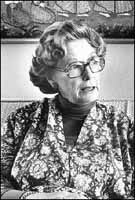 OBITUARY - The Washington Post
OBITUARY - The Washington Post
British Author M.M. Kaye Dies
By Adam Bernstein
Washington Post Staff Writer
Monday, February 2, 2004; Page B06
M.M. Kaye, 95, the author of lushly and lustily detailed books set in Africa and India, including the bestseller "The Far Pavilions," died Jan. 29, it was reported in England. No cause of death was provided.
Ms. Kaye, who sometimes wrote as Mollie Kaye or Mollie Hamilton, was born to British parents in pre-independence India. She saw herself not as an outsider in India but "merely a member of a different caste in a land full of castes." Her fiction often was praised for providing a nuanced look at Indian life while intriguing readers with depictions of desire, intrigue and ethnic conflict.
By far her most successful volume was "The Far Pavilions" (1978), a 960-page opus set in 19th-century India. Ms. Kaye wrote the book during a 15-year span in which she struggled with cancer and made frequent moves around Africa and Asia for her husband's military career.
Its central character is an Indian-born Britisher named Ashton Pelham-Martyn who is orphaned as a boy during a bloody uprising, sheltered by his Indian nurse and then raised in England to be an officer and a gentleman. He returns to India, falls in love with an Indian princess and must struggle with competing cultural alliances.
The book, which some likened to an Indian "Gone With the Wind," sold millions of copies and was adapted into a six-hour miniseries starring Ben Cross and Amy Irving in 1984.
Critics noted that Ms. Kaye's knowledge of her homeland elevated the book above an epic bodice-ripper. As a child, she had spoken at length with elderly Indians about their lives, and their histories informed her work.
Brigitte Weeks, then editor of The Washington Post Book World section, wrote: "Shelves are haunted by the dusty ghosts of so many 'unforgettable' sagas, yet it would be churlish as well as thoroughly craven not to admit that this novel, with its unabashed vigor, has genuine power."
"The Far Pavilions" helped revive interest in Ms. Kaye's earlier works about grand romance and adventure. One was "Shadow of the Moon" (1956), about the 1857 Indian uprising against the British. It featured a heroine named Winter de Ballasteros -- described as half-English, half-Spanish and all Indian. Educated in England, she longs to return to India and the arms of a British official.
Another book was "Trade Wind" (1963), in which Hero Athena Hollis, a coltish Massachusetts abolitionist, visits Zanzibar to end the slave trade and learns brutal truths about life and love.
Mary Margaret Kaye, the daughter of a British intelligence official, was born in Simla, a town near the Himalayas where the government decamped at the peak of summer. She said she was so close to her family's Indian servants that she spoke Hindustani before English. Her nurse often took her to the local market to hear storytellers, who she said had to be skilled at suspense.
The storyteller, she once told The Post, "would get you frightfully excited and then pass the hat around. If he collected enough, the story went on."
She said she was grief-stricken when her family sent her to England for a formal education. On the train that spirited her away, she and her sister made an oath always to return and then swore the vow in Hindustani in case the gods were bilingual.
In England, she became an illustrator of children's books -- "whimsy, whamsy stuff," in her words.
To escape from rabbits, mice and a genial farm atmosphere, she switched to writing thrillers with such titles as "Death in Cyprus," "Death in Kenya" and "Death in Zanzibar."
Her reputation on the rise and her husband's military career waning, she returned to England in 1962 to work on "The Far Pavilions." She said she chose to live in Sussex "because Kipling lived here."
In recent years, she wrote three autobiographies, "The Sun in the Morning," "Golden Afternoon" and "Enchanted Evening."
Her husband, Goff Hamilton, whom she married in 1942, died in 1985.
Survivors include two daughters and a stepdaughter.
